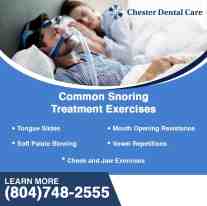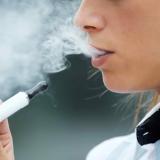Why We Discuss Snoring at Chester Dental Care.
At Chester Dental Care, we address snoring because it's not just an annoying nighttime issue; it can signal serious airway problems. As an airway-focused dental practice, we go beyond just examining teeth and gums. As a trusted dental clinic, we provide general dentistry services for the whole family. Additionally, our team is skilled in airway and sleep dentistry. We assess how the shape, tone, and position of oral structures impact breathing during sleep.
Snoring often begins when the tongue, soft palate, or other tissues relax and partially block the airway. Since we work closely with these structures every day, we're in a unique position to identify the signs that something may be off. Treatments for snoring don't always start with devices or surgery. Sometimes, they begin with how your airway functions and how we can support it.
Many patients don't realize that chronic snoring may be linked to narrow arches, low tongue posture, or poor muscle tone in the mouth and throat. These are issues we evaluate regularly. When we treat snoring, we're not just trying to reduce the sound-we're helping restore healthy airflow. That's why we integrate airway screening and targeted snoring treatments into our dental exams. If we see a potential problem, we bring it up. Because we believe your airway health deserves attention, starting right here in the dental chair.
Key Takeaways
-
Snoring may signal airway dysfunction, not just a sound issue.
At Chester Dental Care, we look for root causes like weak muscle tone, oral structure, or breathing patterns before recommending snoring treatments.
-
Targeted exercises can reduce snoring by strengthening airway muscles.
When practiced daily, these movements support better airflow and are an effective form of snoring treatment at home.
-
Snoring treatments work best when matched to the individual.
Mild habitual snorers often benefit most from exercises. At the same time, those with more serious symptoms may need further evaluation or combined approaches.
-
Daily habits, like side sleeping and nasal breathing, boost results.
Supporting exercises with good sleep hygiene improve the success of natural treatment methods.
-
Early action can prevent long-term sleep issues.
We encourage patients to explore low-risk snoring treatments early rather than wait until symptoms worsen.
What Happens When You Snore
An estimated 45% of adults snore occasionally, and about 25% snore consistently, often disrupting both their partner's sleep and their own. Snoring happens when airflow becomes partially blocked during sleep and causes the tissues in the airway to vibrate. That vibration creates the sound we recognize as snoring, but it's the airflow disruption underneath that matters more.
Several factors can cause this vibration. In many cases, it's the result of reduced muscle tone in the tongue, soft palate, or throat. These muscles naturally relax during sleep, but if they collapse too much, the airway narrows. Sometimes, the issue starts in the nose. Congestion, enlarged turbinates, or a deviated septum can limit nasal airflow and force mouth breathing, which increases the chance of snoring. Sleep posture also plays a role. People who sleep on their backs are more likely to experience gravity pulling the tongue and soft tissues backward.
Snoring can also be an early sign of sleep-disordered breathing. In some patients, the airway closes more significantly, leading to short breathing pauses. That pattern can indicate mild obstructive sleep apnea, even if it hasn't been diagnosed yet.
Many of thesnoring treatments we recommend at Chester Dental Care start with identifying these airway limitations. For patients looking for a natural treatment for snoring, we often begin by improving how the airway works, not just masking the sound.

When Snoring Is a Problem (and When It's Not)
Not all snoring is a sign of trouble. Many people snore occasionally - after a long day, during allergy season, or when sleeping on their back. If it's infrequent and doesn't affect your energy or focus, it may not need attention.
But habitual snoring, night after night, often loud enough to disrupt a partner, can signal something deeper. We pay close attention when patients report waking up tired, gasping during sleep, or feeling foggy during the day. These are red flags for sleep-disordered breathing.
At Chester Dental Care, we often see oral signs that line up with airway restriction: a narrow palate, scalloped tongue edges, or mouth breathing habits. If you or someone close to you notices consistent snoring, it's time for an airway evaluation. We can screen for concerns right in our office and, when needed, coordinate with sleep physicians to explore the full picture.
Can You Train Your Body to Stop Snoring?
Yes, snoring isn't always fixed by devices or surgery. In some cases, you can train your body to snore less by strengthening the muscles that keep your airway open. This approach is part of a growing movement toward natural treatment for snoring, and we're seeing more patients ask about it.
A 2015 study published in Chest looked at people with moderate snoring and mild sleep apnea. The researchers found that doing a set of oropharyngeal exercises, movements that strengthen the tongue, soft palate, and throat, led to a 36% reduction in snoring frequency and a 59% reduction in snoring intensity. That's a powerful result from just a few minutes of daily practice.
These snoring treatment exercises target the same muscle groups that collapse during sleep.
Over time, stronger muscles are less likely to block airflow or vibrate. At Chester Dental Care, we often incorporate these techniques into our airway care plans. For some patients, they work best as part of a larger strategy. But for others, especially those with early signs of airway dysfunction, simple daily exercises can become a valuable tool in reducing snoring naturally and supporting better sleep.
What Are Snoring Exercises and How Do They Work?
Snoring exercises are targeted movements that help strengthen the muscles around your airway, especially the soft palate, tongue, and throat walls. These are the same muscles that tend to relax and collapse during sleep, leading to snoring.
The goal of snoring treatment exercises is to improve muscle tone so that your airway stays open more easily while you sleep. By repeating specific motions each day, you train these muscles to engage and stay firmer, reducing the chance they'll vibrate or block airflow.
Like any form of physical therapy, the results depend on consistency. A few minutes of focused movement every day can gradually lead to better muscle control and less airway collapse. At Chester Dental Care, we guide patients on how to practice these movements safely and effectively. For those looking to reduce snoring without relying on devices, this type of daily muscle training can offer a meaningful difference.
Our 7 Recommended Snoring Treatment Exercises
We often teach patients a set of simple exercises to improve airway muscle tone. These exercises can be done at home and don't require any equipment; just a few minutes a day and a commitment to consistency. Most people benefit from doing these movements for 10-15 minutes daily over several weeks.
These exercises are designed to strengthen the tongue, soft palate, throat, and jaw areas that commonly contribute to snoring. Here are seven we recommend at Chester Dental Care:
Tongue Slide
Purpose: Strengthens tongue posture and movement.
How-to: Press the tip of your tongue to the roof of your mouth, right behind your front teeth. Slowly slide it backward along the palate without losing contact. Repeat for one minute. This improves control and helps prevent the tongue from falling back during sleep.
Soft Palate Blowing
Purpose: Tones the soft palate to reduce vibration.
How-to: Close your mouth and breathe out through your nose. Now, try to exhale while keeping your lips sealed and cheeks puffed out as if blowing up a balloon. Hold the pressure for 10 seconds. Repeat five times. It's a key snoring treatment exercise for soft palate weakness.
Cheek Pull
Purpose: Strengthens cheek and throat wall muscles.
How-to: Place a finger inside your cheek and try to pull it outward while using your facial muscles to resist. Hold for 10 seconds, then switch sides. This motion engages the lateral airway tissues that can collapse during sleep.
Mouth-Opening Resistance
Purpose: Targets the muscles that stabilize the jaw and airway.
How-to: Place a hand under your chin. Try to open your mouth while gently resisting with your hand. Hold the tension for 5-10 seconds and repeat five times. This helps limit the mouth from dropping open at night, which is a common cause of snoring.
Vowel Repetition Drill
Purpose: Engages the throat and soft palate muscles.
How-to: Say the vowels "A-E-I-O-U" slowly and clearly, exaggerating the mouth and throat movements. Repeat the cycle for one to two minutes. This drill activates airway muscles and improves coordination.
Jaw Push-Forward Hold
Purpose: Strengthens jaw positioning muscles.
How-to: With lips closed, gently push your lower jaw forward and hold it in place for five seconds. Repeat five times. This helps support an open airway by improving mandibular tone.
Tongue Press-and-Hold
Purpose: Improves tongue strength and stability.
How-to: Firmly press the entire tongue flat against the roof of your mouth and hold for five seconds. Repeat ten times. This reduces the backward collapse of the tongue during sleep.
These snoring treatment exercises can be done as part of a daily routine. We suggest sticking with them for at least three to four weeks to notice improvement. For patients interested in snoring treatment at home, these exercises can be a low-risk, natural first step, especially when guided by a trained airway-focused provider.
Realistic Expectations from At-Home Snoring Exercises
Snoring treatment at home can help, especially for those with mild to moderate snoring caused by weak airway muscles or poor tongue posture. These exercises work best for patients who are otherwise healthy, don't have severe nasal blockages, and haven't been diagnosed with obstructive sleep apnea.
With daily practice, some people begin to notice a reduction in snoring after three to four weeks. Improvements are usually gradual. The snoring may become softer, less frequent, or stop waking a bed partner. But it's important to stay consistent as these changes come from building muscle tone over time.
That said, snoring exercises are not a substitute for a full clinical assessment. If you experience daytime fatigue, gasping during sleep, or a history of sleep apnea in your family, it's important to explore more than a natural treatment for snoring. At Chester Dental Care, we often use these exercises as part of a broader airway care plan that includes screenings, imaging, and collaboration with sleep medicine professionals when needed.
For the right patient, snoring treatment at home can support better sleep and healthier breathing. Knowing when to seek help is just as important as knowing when to begin.
How We Use These Techniques in Our Airway-Focused Practice
At Chester Dental Care, airway evaluation is built into the way we examine our patients, not just when they complain about snoring. We assess the size and shape of the dental arches, the resting position of the tongue, signs of mouth breathing, restricted nasal airflow, or scalloped tongue edges. These are small clues that often point to a bigger picture: compromised airway function.
When we see patterns that suggest early airway collapse or mild sleep-disordered breathing, we may include muscle training in the care plan. For patients with mild snoring, this can be a natural, low-risk starting point. In more complex cases, we combine exercises with guided breathing work, oral appliance therapy, or referrals for further sleep studies.
Our job isn't just to hand out a list of exercises. We guide patients on how to do them correctly, how often to practice, and what signs to track. Snoring treatments work best when they're tailored, not generic, and that's where our experience in airway and sleep dentistry makes a difference. We don't just look at the noise; we look at the airway behind it.
Who Should Try Snoring Exercises and Who Shouldn't
Not all treatments for snoring work the same for everyone. Here's how we help patients decide whether exercises are the right fit.
Good Candidates for Snoring Exercises
Snoring exercises are best suited for people with mild, habitual snoring and no serious daytime symptoms. If you snore regularly but don't feel excessively tired during the day and haven't been diagnosed with sleep apnea, these treatments may offer noticeable improvement, especially when paired with better nasal breathing or posture changes.
Who Should Be Cautious
If you've been diagnosed with moderate to severe obstructive sleep apnea (OSA), muscle exercises alone may not be enough. These patients need supervised care and may require oral appliances, Vivos therapy, or other interventions. Exercise can support treatment, but it shouldn't replace it.
When to Combine with Other Approaches
We often recommend pairing snoring exercises with custom oral appliances for better results. This combined strategy supports both structure and function, addressing the airway from multiple angles for more lasting relief.
Combine Exercises With These Daily Habits for Better Results
Exercises are more effective when paired with healthy habits that support airway function. Here are a few simple changes we often recommend alongside daily muscle work.
Sleep on Your Side, Not Your Back
Back sleeping makes it easier for the tongue and soft tissues to fall backward and block the airway. Side sleeping can help keep the airway open and reduce vibration.
Support Nasal Breathing
Using a saline nasal rinse or an adhesive nasal strip can improve airflow. Some patients also benefit from mouth taping to encourage nasal breathing during sleep, always with guidance.
Avoid Alcohol, Allergens, and Heavy Meals Late at Night
Alcohol relaxes airway muscles. Allergens and late eating can increase congestion and inflammation. Reducing these factors helps support better breathing.
Drink More Water
Dehydration thickens mucus and makes airway tissues more likely to stick and vibrate. Staying well hydrated helps reduce snoring naturally.
What We Want You to Know About Natural Snoring Relief
At Chester Dental Care, we believe the best approach to snoring starts with the least invasive option. For many of our patients, that means trying a natural treatment for snoring, like daily muscle exercises, before moving to devices or procedures. It's low risk, low cost, and can be done right at home.
These treatments aren't a cure-all, but they can offer real benefits when matched with the right person and guided by the right care. We often use exercises as a first step or as part of a larger strategy that includes airway support, sleep hygiene, and collaboration with medical providers.
If you've just started to notice snoring, or if it's been building quietly for years, there's real value in taking early, simple action. Your airway matters more than most people realize. And the sooner we support it, the better the long-term outcomes can be. Ready for an appointment? Contact us to find out more aboutsnoring relief.

Frequently Asked Questions
1. Can I try snoring exercises on my own, or do I need a professional to guide me?
You can begin these exercises at home, especially if your snoring is mild. At Chester Dental Care, we often walk patients through the correct technique during a visit, but we also support people who want to start these treatments on their own with guidance.
2. How long should I keep doing snoring exercises before expecting results?
Most patients see some change in about three to four weeks if they're consistent. At Chester Dental Care, we recommend doing the exercises daily for at least 10-15 minutes. Like any muscle training, consistency matters with treatments for snoring.
3. Are snoring exercises enough if I already have a sleep apnea diagnosis?
No. If you've been diagnosed with obstructive sleep apnea, exercises alone aren't enough. We may still use them as a supportive therapy, but full snoring treatments for sleep apnea usually require additional steps. OSA should always be evaluated by medical professionals. At Chester Dental Care, we work with medical professionals to coordinate care.
4. What makes your approach to snoring different from other dental offices?
Chester Dental Care focuses on airway health, not just teeth. We've spent nearly a decade working in sleep and airway dentistry, so we approach treatments for snoring with a broader lens by looking at nasal airflow, oral posture, and long-term breathing patterns.
5. I live in Richmond but work in Chester. Can I still come in for a snoring evaluation?
Yes, absolutely. We serve patients from Richmond, Hopewell, Midlothian, Chesterfield, and surrounding areas. If you're looking for personalized snoring treatments, we'd be happy to schedule a visit and walk through the options that make sense for your situation.
Final Thoughts and When to Reach Out
Snoring exercises won't solve every problem, but they can help many mild to moderate snorers breathe and sleep more easily. If your snoring disrupts sleep, leaves you tired during the day, or affects your partner's rest, it's time for an airway evaluation.
We're here to guide, assess, and adjust your care plan based on what's actually working. Whether you're trying snoring treatment at home or seeking the next steps, you don't have to figure it out alone.
Chester Dental Care - Shwetha Rodrigues DDS proudly serves patients in Chester, Richmond, Midlothian, Hopewell, and surrounding areas. If you're looking for clear, trusted guidance on snoring relief, we're ready to help.
To learn more about treatments for snoring or to schedule an airway consultation, email us at frontdesk@chesterdentalcareva.com or call us at(804) 748-2555.



